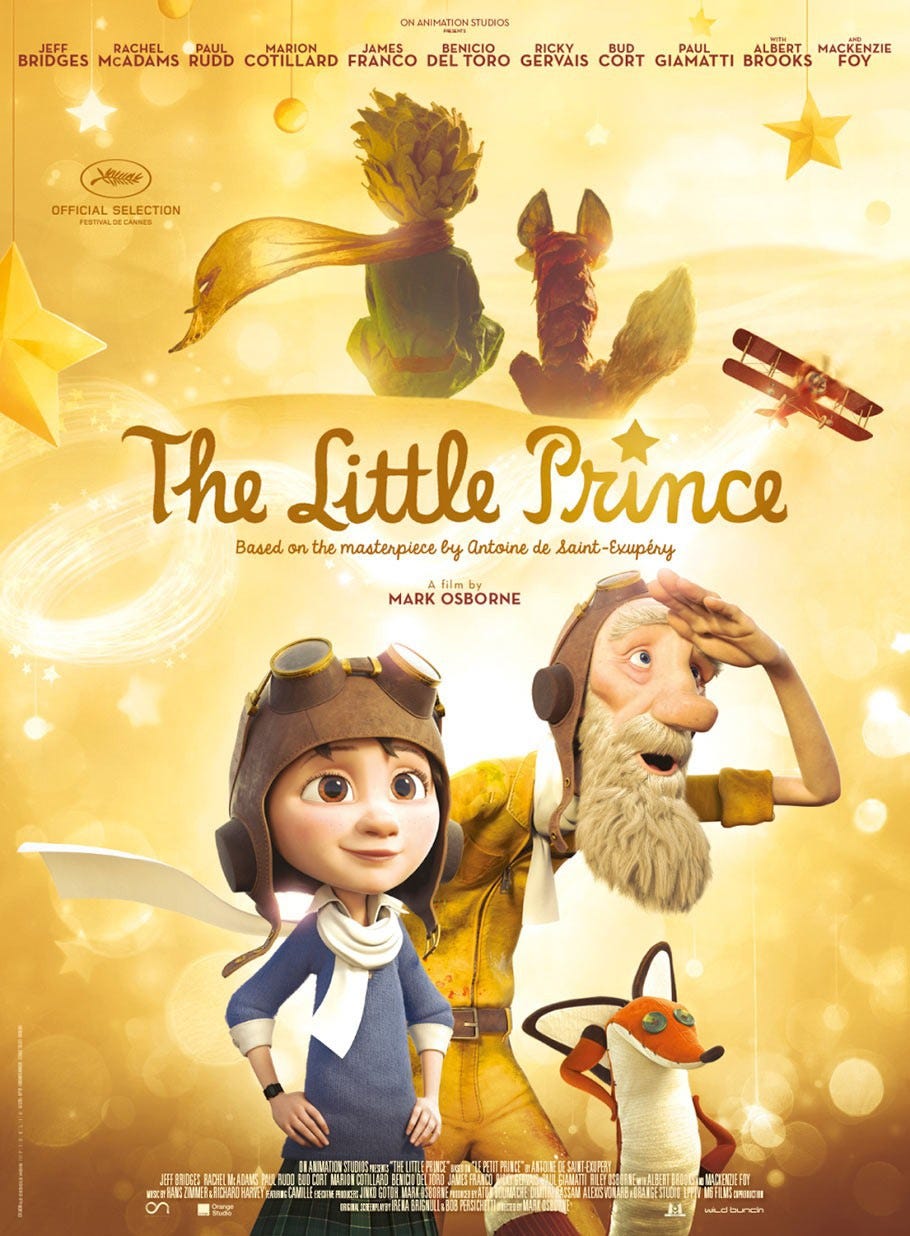The Grown-Ups Are Certainly Very Odd
I’ve long come to the realization that adults are just children who have been driven insane by fear, unhealed past hurts, and the demands of the world. In part, I have Antoine de Saint-Exupéry’s The Little Prince to thank for that.
The Little Prince is one of the most beloved children’s books and the second most translated book in the world (after The Holy Bible). Saint-Exupéry was not around to witness the success of his parable of love, adulthood, and friendship- being a military pilot, he died just 1 year after the book’s publishing at age 44 in an aircraft crash- a biographical fact within which many find great poignancy given that in the book, The Little Prince watches the sun set on his planet exactly 44 times.
The Little Prince is a child who lives on a tiny planet or asteroid the size of a house. He spends his time cleaning out 3 tiny volcanos, pulling up the baobab trees that constantly threaten to overgrow and destroy his planet, and, caring for his beloved rose. Though he loves his rose very much, he feels tormented by her demands and vanity. In a spat with her, he decides to embark on a journey to different planets in pursuit of knowledge.
The neighboring planets are much like his own, with a single person occupying each planet.
On the first planet, he visits a King but finds it very odd that someone should be a King with no subjects to rule over. Being that there is no one around- The King spends his time shouting commands that were already going to happen anyway. For example, he commands the sun to set in the evening whenever it is ready to set. The Little Prince is amused by this behavior and moves on.
On the second planet, he meets a conceited man who demands admiration.
“Ah! Ah! I am about to receive a visit from an admirer!” he exclaimed, from afar, when he first saw the little prince coming”. The conceited man is obsessed with being “the handsomest, the best-dressed, the richest, and the most intelligent man” on his planet. The Little Prince indulges him for a bit but grows quite bored with this bizarre behavior and moves on.
On the next planet, he meets a drunkard who offers a circular explanation for his drinking habit- he drinks to forget the shame of his drinking.
Following that, he meets a businessman who spends his time counting and re-counting the stars, claiming that he owns them all. It strikes the prince as ridiculous to own things that one cannot touch, the prince owns a flower and the volcanoes on his planet and reflects that he is of use to them because he takes care of them. “What is the use of owning things one cannot take care of?”, he wonders.
He moves on to the fifth and smallest planet- where he meets a lamplighter whose job it is to extinguish lamps during the day and re-light the lamps at night. The problem is that each day only lasts just a few short minutes before it’s nighttime again. The lamplighter exhausts himself carrying out his repetitive and pointless task. The prince leaves him to it.
On the sixth and final planet, he meets a geographer. The geographer carefully maps out all the features of his planet- rivers, mountains, and valleys- into a book. The prince first believes he has finally come across an adult engaged in a meaningful activity. He’s disappointed when he learns the geographer has never actually left his desk and explored the planet he’s on- he merely theorizes about what might exist.
It’s easy to recognize our own behavior in the ridiculous and insane behavior of the grown-ups the prince visits.
Something about the structures embedded within adult life (responsibility, fear, and judgment in an unforgiving world) pushes us further away from the innocence and innate, childlike wisdom of the prince and makes us more resemble the businessman uselessly trying to own the stars, the exhausted lamplighter who has lost sight of the initial purpose of his task or the drunkard trapped in a vicious cycle.
Disguised as a children’s book, Antoine de Saint-Exupéry has written a handbook on how to be a sane and thoughtful adult. I find this book worth revisiting frequently as the world makes these truths easy to forget.
Also worth watching is the 2015 movie adaptation which is a wonderful and fresh take on the parable and highlights how the insanity of grown-up logic is increasingly pushed on children beginning at younger and younger ages. The film follows an overscheduled little girl that befriends an eccentric aviator who introduces her to the adventures of The Little Prince. Check it out on your favorite streamer!
Bye for now.







This wss insightful and thought provoking......and as the reviewer so rightly notes - these scenarios dot various times of adulthood - and sadly brought on by the mind-boggling knowledge and fear of the adult human condition.